| Srl | Item |
| 1 |
ID:
161594
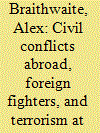

|
|
|
|
|
| Summary/Abstract |
Terrorist attacks in Brussels (May 2014) and Paris (January and November 2015) highlight the threat related to the arrival of foreign fighters (FFs) from civil wars elsewhere. We develop an argument suggesting that terrorism at home is systematically affected by the exit of the so-called FFs out of civil wars abroad. We contend that foreign civil conflicts ending in success for rebel groups can result in a surplus of well-trained FFs, increasing the risk of terrorism at home. By contrast, when rebel groups are defeated in foreign civil conflicts, we anticipate a restriction in the flow of FFs, which reduces the likelihood of terrorism at home. Empirical analyses on most countries for the years 1970 to 2006 support these hypotheses. Our tests also demonstrate that the flow of FFs is associated with the creation of new terrorism campaigns rather than the exacerbation of existing operations.
|
|
|
|
|
|
|
|
|
|
|
|
|
|
|
|
| 2 |
ID:
161595
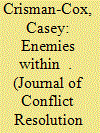

|
|
|
|
|
| Summary/Abstract |
I examine how the chief executive’s political party affects domestic terrorism within democracies. In particular, I contribute to the literature on terrorism within democracies by arguing that domestic terrorist groups prefer attacking when right-wing parties hold office. I find evidence for this claim as well as results indicating that left-wing executives are more likely to cut deals with domestic terrorist groups. These trends suggest that domestic terrorist groups attack during right-wing governance to build their reputation and reduce violence during left-wing governance to appear moderate and get a deal. These results contribute to literatures on differences between left and right parties, how political institutions affect terrorism, and differences between domestic and transnational terrorism.
|
|
|
|
|
|
|
|
|
|
|
|
|
|
|
|
| 3 |
ID:
161599
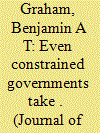

|
|
|
|
|
| Summary/Abstract |
This article analyzes an understudied and contested form of government taking, transfer restriction, which has supplanted expropriation as the most ubiquitous and costly type of international property rights violation. Veto-player-type constraints curtail governments’ ability to engage in outright and (nontransfer related) creeping expropriation but have little impact on their ability to generate wealth via transfer restrictions. We use a formal model to derive testable implications regarding the effect of political institutions and domestic politics on governments’ ability to collect these two types of rent. Empirically, we use novel time-series cross-sectional data to show that while veto-player-type political constraints diminish expropriation risk, transfer risk is much less affected: even constrained governments impose transfer restrictions.
|
|
|
|
|
|
|
|
|
|
|
|
|
|
|
|
| 4 |
ID:
161593
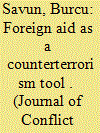

|
|
|
|
|
| Summary/Abstract |
Is foreign aid effective in reducing terrorism? The existing evidence is mostly negative. We argue that this pessimistic outlook on the efficacy of aid as a counterterrorism tool is partly a function of focusing on only one type of aid: economic aid. Governance and civil society aid can dampen the participation in and support for terrorism by altering the political conditions of a country. We expect countries that receive high levels of governance and civil society aid to experience fewer domestic terrorist incidents than countries that receive little or none. Using a sample of aid eligible countries for the period from 1997 to 2010, we find that governance and civil society aid is effective in dampening domestic terrorism, but this effect is only present if the recipient country is not experiencing a civil conflict. Our findings provide support for the continued use of democracy aid as a counterterrorism tool.
|
|
|
|
|
|
|
|
|
|
|
|
|
|
|
|
| 5 |
ID:
161597
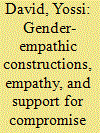

|
|
|
|
|
| Summary/Abstract |
The goal of the present study was to investigate how empathy and gender-empathic constructions affect the levels of support for political compromise in an intractable conflict. Gender-empathic constructions relate to perceptions that individuals hold about self or others as having feminine-empathic gender traits. We hypothesized that empathy will be positively associated with support for compromise, but that perceiving one’s own group as feminine empathic will be negatively associated with such attitudes, with empathy being a significant mediator. Data were collected through a public opinion survey conducted with a representative sample of Israeli-Jewish adults (N = 511). The findings supported our hypotheses, thus indicating that perceiving one’s own group as having feminine-empathic traits and empathy toward opponents made significant contributions to explaining Jewish-Israeli willingness to compromise with Palestinians. The implications of our findings for understanding the role of gender-empathic constructions and of empathy in conflict resolution are discussed.
|
|
|
|
|
|
|
|
|
|
|
|
|
|
|
|
| 6 |
ID:
161600


|
|
|
|
|
| Summary/Abstract |
Humanitarian interventions (HIs) are a common aspect of US foreign policy. Policy makers acknowledge the importance of public support for interventions, but scholars remain divided about the extent and basis of that support. Using a series of survey experiments, we evaluate attitudes about HIs, assess whether the public supports these interventions for instrumental or moral reasons, and test which aspects of morality are most salient. The findings indicate that interventions addressing humanitarian crises boost public support, with the basis of that support residing primarily in normative contentions that the United States has a moral obligation to protect civilians. This research advances understandings of morality in foreign policy, mediates debates about the determinants of public attitudes—including when the public makes moral rather than prudent decisions about interventions—and has important policy implications. It suggests a morally motivated public may be more likely to support risky HIs, increasing the likelihood of using force.
|
|
|
|
|
|
|
|
|
|
|
|
|
|
|
|
| 7 |
ID:
161596


|
|
|
|
|
| Summary/Abstract |
This article uses original survey data to study the effects of the United Nations Mission in Liberia (UNMIL) on the political attitudes and behaviors of ordinary Liberians. Three results emerge: (i) UNMIL has positive, statistically significant effects on political participation measured over multiple outcome indicators; (ii) UNMIL’s effects display heterogeneity across individual outcome indicators, most positive effects are concentrated around measures associated with participation in national politics as well as political interest and efficacy, while the effects on participation in local politics are mixed; and (iii) self-reported measures of citizens’ interactions with UNMIL military personnel and exposure to democracy and to human rights campaigns carried out by international actors have strong positive associations with political participation, suggesting that results are driven by security and nonsecurity mechanisms. This article discusses the implications of these findings and areas for future research.
|
|
|
|
|
|
|
|
|
|
|
|
|
|
|
|
| 8 |
ID:
161598
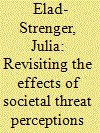

|
|
|
|
|
| Summary/Abstract |
Past research has produced convincing evidence for the association between perceived societal threat and political conservatism. Based on the view of political worldviews and threat perceptions as multifaceted constructs, the present study suggests that certain types of perceived threat are actually associated with the endorsement of more politically liberal positions. Employing a three-wave naturalistic design, we examined the unique longitudinal effects of perceived threats from real-life political events that challenge either liberal or conservative values, on conflict-related attitudes, using a nationally representative sample of Jewish-Israelis (N = 437). Consistent with our hypotheses, perceived threat from events that challenge conservative values was associated with increased militaristic attitudes and decreased willingness to compromise for peace over time, whereas perceived threat from events that challenge liberal values was related to decreased militaristic attitudes and increased willingness to compromise for peace over time. Theoretical and practical implications of these longitudinal effects are discussed.
|
|
|
|
|
|
|
|
|
|
|
|
|
|
|
|